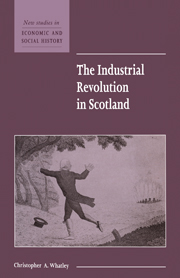Book contents
- Frontmatter
- Contents
- Acknowledgements
- Map of Scotland
- Introduction
- 1 Identifying Scotland's Industrial Revolution (1): the pre-Union inheritance
- 2 Identifying Scotland's Industrial Revolution (2): Union to c.1850
- 3 Causes
- 4 Social aspects of the Scottish Industrial Revolution
- References
- Index
- New Studies in Economic and Social History
3 - Causes
Published online by Cambridge University Press: 12 October 2018
- Frontmatter
- Contents
- Acknowledgements
- Map of Scotland
- Introduction
- 1 Identifying Scotland's Industrial Revolution (1): the pre-Union inheritance
- 2 Identifying Scotland's Industrial Revolution (2): Union to c.1850
- 3 Causes
- 4 Social aspects of the Scottish Industrial Revolution
- References
- Index
- New Studies in Economic and Social History
Summary
Scotland's Industrial Revolution has been variously explained [146]. For some, the process was relatively uncomplicated. Scotland was part of the western world's international market system, entry to which had been obtained through geography and comparative advantage in textile manufacture. Overseas trade provided the key to nineteenth-century success in shipbuilding and heavy engineering which in tum owed much to the existence of rich deposits of coal and iron in the central belt. It is an argument which has been developed with various degrees of refinement and at a macro-economic level it makes much sense. Yet the emergence of Scotland as a major European industrial region was by no means inevitable and the reasons for it require fuller explanation, especially in the light of the differential pattern of regional development which has been identified within Scotland. It has been argued that the industrial regions in Britain each had their own internal dynamics and interconnecting characteristics which determined how they would respond to external challenges and opportunities [163]. Other British regions had declined after initial spurts, not only where hand-working had perished in the face of mechanised competition but even in east Shropshire where a successful iron industry and supporting transport infrastructure had been established [244]. A more telling comparison is Ireland which had had much in common with Scotland during the eighteenth century but by the 1820s had diverged to the extent that, with the notable exception of Belfast and the surrounding region, it was experiencing de-industrialisation [215; 230].
Although Scotland's industrialisation process was in many respects linked with that of England, it is not sufficient simply to apply currently favoured explanations for England's Industrial Revolution to her northern neighbour. Enough has been said already about the differences in the pace and nature of Scottish economic development. A more appropriate model for understanding and accounting for the early stages of Scottish industrialisation might be that developed by the late Alexander Gerschenkron who has argued in the context of European industrialisation that not only will backward countries industrialise fastest but that they will also be characterised by a number of other factors which are evident in the Scottish case.
- Type
- Chapter
- Information
- The Industrial Revolution in Scotland , pp. 38 - 63Publisher: Cambridge University PressPrint publication year: 1997



